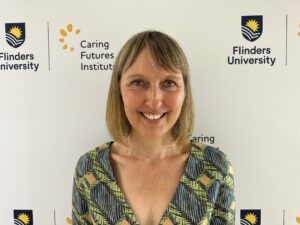Flinders University researchers will help people with dementia meaningfully engage with their loved ones, address common sleep disturbances, and increase our understanding about Alzheimer’s disease – thanks to grants from the Dementia Australia Research Foundation.
Three Flinders researchers were awarded a total of $225,000 for their projects in the 2022 Grants Program.

Dr. Miia Rahja from the College of Medicine and Public Health says the Lucas’ Pawpaw Remedies Project Grant, worth $75,000, will enable her team to create an evidence-based program to help care supporters engage meaningfully with loved ones with dementia living in residential aged care homes.
“Programs that teach loved ones how to communicate with people living with dementia, to involve them in activities that are suitable to their abilities, or to understand behavioural changes that may occur when the person with dementia has difficulty expressing their needs or wants, have not been available in residential care up to this point,” says Dr Rahja.
“Our study will adapt one such program that was designed for persons living in the community to residential care. We will use surveys, interviews and group discussions to find out how beneficial the program can be in this setting. The research will then look at how these types of programs can be included in residential care in the future.”
Dr. Suzanne Dawson, from the Caring Futures Institute, will lead a study examining the effectiveness of weighted blankets as a safe sleep intervention for people with dementia experiencing sleep disturbances thanks to the Hazel Hawke Research Grant in Dementia Care worth $75,000.
“Sleep disturbances result in decreased quality of life for the person with dementia and cause significant stress for caregivers. Sleep disturbances are also associated with increased admissions to care settings and higher healthcare costs. As such, sleep disturbances for people living with dementia are recognised as a major challenge that needs to be addressed,” says Dr Dawson.

“The use of weighted blankets is emerging as a safe sleep intervention option, although little is known about the effectiveness for people with dementia. If successful, weighted blankets could be an easily implemented intervention to improve sleep outcomes and quality of life for people living with dementia.”
Alzheimer’s disease, the most common form of dementia, currently has no cure or effective therapy, in part due to gaps in our understanding of how the progressive neurodegenerative disorder arises in the brain.
Now, thanks to $75,000 in Bondi2Barossa project grant funding, Dr. Kristie Stefanoska will increase our understanding of Alzheimer’s disease development by investigating how tau-induced brain cell death contributes to cognitive decline.
Dr. Stefanoska says scientists are seeking to unravel why the toxic clumping of a brain protein called tau is underlying in Alzheimer’s disease.
“This destroys the structure of neurons and prevents important nutrients from reaching parts of the brain. Those parts eventually shrink and die. Unfortunately, we don’t know why or how this occurs, so our team will increase our understanding of Alzheimer’s disease development.”
Dr. Stefanoska is aiming to establish whether a protein called NSF could be a therapeutic target to reduce the detrimental effects of tau and protect neurons from its toxicity.
“The results will facilitate a more informed approach in the future development of drug therapies for cognitive impairment in Alzheimer’s disease.”
The full list of grant recipients is available here.
The Dementia Australia Research Foundation is the research arm of Dementia Australia, which provides funding to support new and emerging dementia researchers. In 2022, $2.4 million in funding was allocated to support Project Grants, Post-doctoral Fellowships and Mid-Career Research Fellowships.








